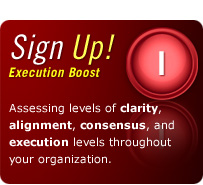February 4th, 2008
by John Spence
I was recently invited to return to the Wharton School of Business for the fourth year in a row to teach a special class on strategic planning for the Securities Industry Institute. I called them last week to ask if it were possible to shift the class more from “planning” to strategic “thinking” this year, but was surprised to find out that 98 executives had already signed up for the class based on the catalog description of it as a solid look at how to write and effective strategic plan. So I decided to go back and take a hard look at the class and see if I could update it a bit and was surprised to have an epiphany of sorts.
I have long decried that one of the factors that inhibits the ability to write a good strategic plan is the lack of “strategic thinking” that typically goes into the planning process. If a practitioner is not spending serious time and effort on the thinking part of the equation, there is the possibility they can do the planning part of the process (the methodology, the framework) superbly, only to create a flawed plan because it was based on poor information and ideas. Then I realized that was another major issue that I simply had not been stressing enough; the execution of the plan.
Read the rest of this article »
January 28th, 2008
by Dr. Brian Higley
One of my favorite areas of research is job and life satisfaction – and how business leaders can structure their team to be both profitable financially and to enhance the lives of the individuals making up the team at the same time. I recently came across some thoughts on the components of a satisfied life and thought I’d share some of my views on how these components can enhance both your life and your organization.
I was reading about a theory of life satisfaction that made the claim that, in essence, all people want 3 things from life: (1) to be, (2) to know and (3) to enjoy. As I thought about all of the journal articles I’ve read, experts I’ve spoken with, and experiences I’ve had in my 15 years in this field, this sounded like a pretty reasonable claim to me. So, I began to think a lot about these three categories and how they might relate to not only a better life, but also a better team and/or business.
Read the rest of this article »
December 23rd, 2007
by John Spence
I was recently out in California having a conversation with one of my clients, the COO of a Fortune 500 firm that has engaged me to coach several of his senior leaders. Currently I am working with a handful of divisional CEOs, each running a 200 – 600 million dollar enterprise. During our talk the COO said something that really struck home for me and gave me a super idea of what he wanted me to do for him. “John, these are absolutely fantastic guys, but they can be tough to manage… please help make them easier to manage.”
Wow, that is a perfect statement because it gets right to the heart of why I am typically called in to coach someone. The executives I coach are bright, talented, bold, creative, entrepreneurial and driven… all truly valuable traits. But taken to the extreme, these same traits can make these sorts of folks very hard to manage and direct. What’s more, if they cannot learn how to control their behavior and fit in more comfortably in a senior role, the very things that made them successful up to this point in their career, can actually lead to their demise.
Read the rest of this article »
November 17th, 2007
by Dr. Brian Higley
As a business leader, psychologist, and educator, I am often amazed by what seems to me to be an epidemic of anxiety, dissatisfaction, disengagement, and depression in this culture. From the boardrooms to the classrooms to the therapist’s chair, people seem to be continuously reporting feeling more overwhelmed (“work never seems to end”), less energetic (“I can’t seem to get out of bed without my morning coffee – sometimes two cups!”), and not very hopeful about the future (“oh, well, I guess that’s life – you learn to accept it”). From time to time, I have felt these feelings myself as I attempt to maintain a satisfying business and personal life – and I’m considered in some circles to be an “expert” on how to run a more efficient business and live a happier life! What is going on here? After countless conversations with my colleagues, clients, and other experts in the field, I believe we may have come to a very important answer; one that can positively impact your business and – most importantly, I think – your life in very meaningful ways. I want to begin this article with a discussion about what I call “The Purposeful Doing Movement.”
Read the rest of this article »
November 17th, 2007
by John Spence
For the past three years I have been invited to be a guest lecturer on “strategic thinking” at a special event at the University of Pennsylvania’s Wharton School of Business. Typically I have about 120 senior executives in my class and during the session I will pose this question: “What percentage of the time do companies that have a clear vision and a specific plan to achieve that vision, effectively execute to that plan?” The answer I most often get is 10-15% of the time. Wow, that is scary
This is one of the biggest issues I face in all of my consulting and training assignments. It is what we refer to in our firm as the “Knowing-Doing Gap.” Companies know what they are supposed to do, they have a solid plan to dominate their market – but creating a performance-oriented culture of disciplined execution that can effectively implement the plan seems to be a challenge that few can conquer. If that were not frustrating enough, when you step back and look at the financial implications they can be staggering. Inability to execute to plan is likely responsible for the overwhelming percentage of lost revenues in most large organizations.
Read the rest of this article »



